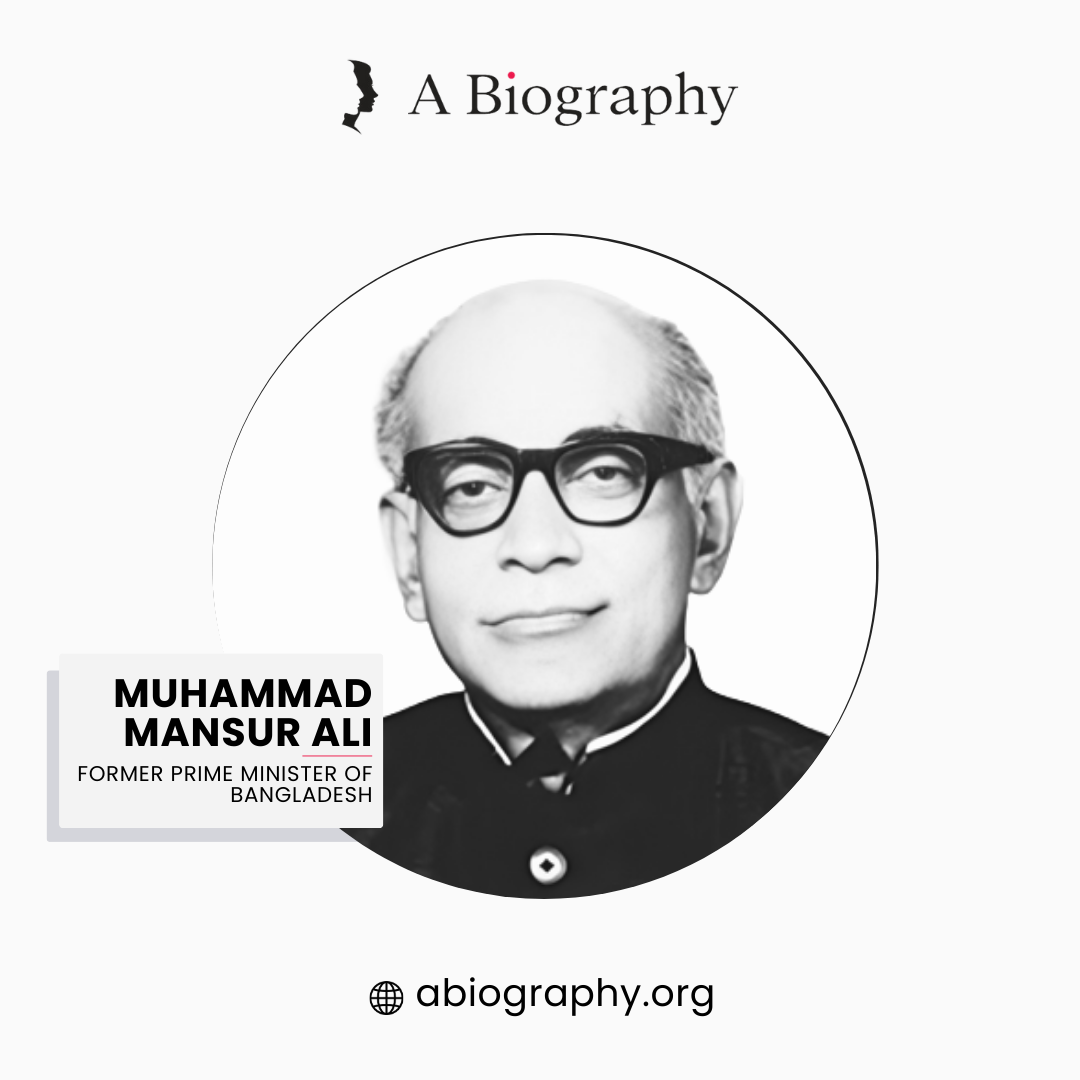BIOGRAPHY OF
Muhammad Mansur Ali
(Former Prime Minister)
(16 January 1919 – 3 November 1975)
Table of Contents
ToggleIntroduction
Muhammad Mansur Ali, a key political figure. He served as the Prime Minister of Bangladesh from 1972 to 1975. He played a significant role in the country’s independence movement and was instrumental in forming the provisional government during the Liberation War of 1971. Mansur Ali focused on rebuilding the nation after independence. He mostly emphasized economic development and infrastructure improvement. However, his time as Prime Minister was tragically cut short in 1975. Despite his brief tenure, Mansur Ali’s contributions to Bangladesh’s struggle for independence and his efforts in nation-building remain noteworthy.
Life Of “Muhammad Mansur Ali” At A Glance
Known For: Former Prime Minister
Born: 16 January 1919
Age: 56
Birthplace: Qazipur, Sirajganj
Nationality: Bangladeshi
Father: Haraf Ali Sarkar
Education:
B.A., Maulana Azad College
M.A., Aligarh Muslim University
Occupation:
Minister Of Finance
Minister Of Communications
Minister Of Home Affairs
Prime Minister
Spouse: Begum Amina
Children:
Mohammad Selim
Mohammed Nasim
Md. Rezaul Karim
Md. Maruf Ahmed
Md. Monjur Hossain
Shirin Hussain
Death: 3 November 1975
Death By: Killed, Dhaka Central Jail
Early Life
Muhammad Mansur Ali was born on January 16, 1919, in the village of Kuripara in Qazipur, Sirajganj, Bengal Presidency. He came from a Bengali Muslim family. His father’s name was Haraf Ali Sarkar.
Education and Career
Mansur Ali went to Gandhail Ratankandi Union Ali Ahmed High School. Then he moved to B.L. High School. He passed his higher secondary from Government Edward College, Pabna. In 1941, he completed his B.A from Kolkata Islamia College, also known as Maulana Azad College. He later pursued a Master’s in economics and law from Aligarh Muslim University and passed n 1945.
During his time at Aligarh, Mansur Ali became an active member of the Muslim League. This political party advocated for a separate Muslim state called Pakistan, led by Muhammad Ali Jinnah. From 1946 to 1950, he served as the vice president of the Pabna District Muslim League. In 1948, Mansur received training at Jessore Cantonment and became known as Captain Mansur.
After completing his education, Mansur Ali decided to practice law and joined the Pabna District Court in 1951.
At the time, Mansur Ali became a member of the Awami League’s central executive committee and president of its Pabna District unit. In 1952, he was arrested for supporting protests against the declaration of Urdu as the only official language. He wanted Bengali to be recognized and for the provinces to have more power. After his release, he was elected to the East Pakistan Legislative Assembly in 1954. He served in various positions in the provincial cabinet. Mansur Ali was arrested again after a coup led by Ayub Khan, the former President of Pakistan. He played an important role in the Six Point Movement, demanding regional autonomy and opposing the military regime.
During the Bangladesh Liberation War in 1971, Mansur went underground to help organize a government in exile. After Bangladesh gained independence, he held positions as the minister of finance, communications, and home affairs. In 1975, when a one-party, presidential system was introduced, Mansur was appointed as the prime minister. He worked with Sheikh Mujibur Rahman to establish the Bangladesh Krishak Sramik Awami League.
Personal Life
Muhammad Mansur Ali married Begum Amina, the daughter of a District Judge from Rangpur. They had five sons and one daughter. His oldest son, Dr. Mohammad Selim, became a lawyer in Bangladesh and studied at Lincoln’s Inn to become a member of the BAR. He is well-known in politics and became a member of the Presidium for the Awami League. He also served as the Chairman of the Bangladesh Foreign Affairs Committee. He represented his father’s constituency, Kazipur, in the Sirajganj District as a Member of Parliament (MP).
Mansur Ali’s second son, Mohammad Nasim, also became a prominent leader. He was an MP and held ministerial positions in the Awami League government from 1996 to 2001, serving in the Telecoms and Home ministries.
On August 15, 1975, a group of military officers assassinated Mujib, the leader of Bangladesh, along with his family. This event, known as the August 15 coup, was planned by Khondaker Mushtaq Ahmad, who was unhappy with Mujib’s government and later became president. After the assassination, Mansur and other Awami League leaders went into hiding.
Khondaker Mushtaq Ahmad, who became the new leader, invited Mansur and others to join his government, but they refused. On August 23, 1975, they were arrested by the army. Unfortunately, because they did not support Ahmad’s regime, they were killed while in prison on November 3. This event was one of the important events that led to the November 3 coup. His body was then given to his family after 2 days of his death.
Conclusion
After the liberation war, Muhammad Mansur Ali served from 1972 to 1975. His tenure witnessed important strides in the nation’s development and governance. He did everything he could to rebuild the nation. He constructed Elenga – Bhuapur Highway for better communication between Dhaka and Sirajganj. He made sure of better ferry service in Bhuapur ghat. He also built roads in his hometown Qazipur.
Muhammad Mansur Ali is one of the great leaders who we lost in 1975. His contribution towards the nation is remarkable and cannot be forgotten.

